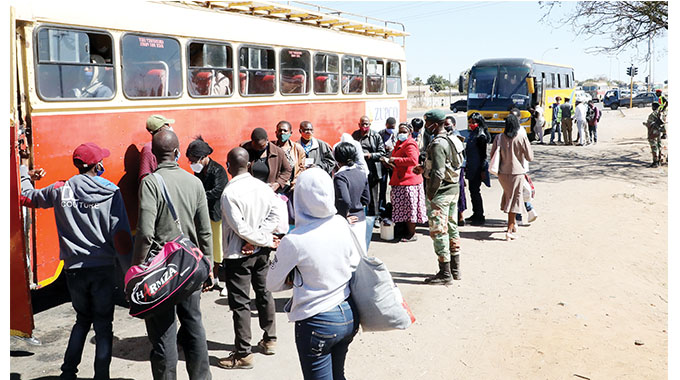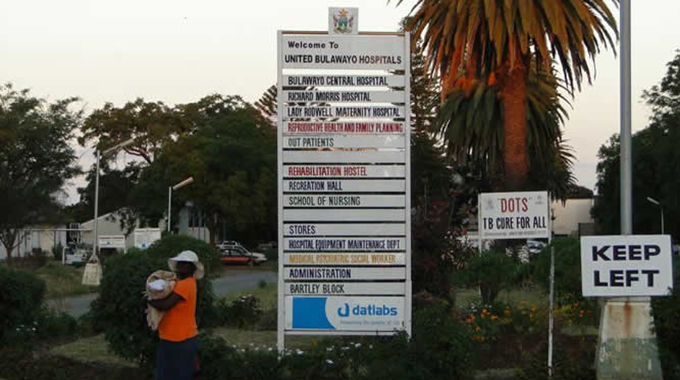Govt, private firms urged to mechanise and computerise to fight Covid-19

Mashudu Netsianda and Leonard Ncube, Chronicle Reporters
GOVERNMENT institutions and privately-owned companies should start mechanising and computerising their systems and where possible allow people to work from home as well as come up with comprehensive screening for Covid-19, health experts said yesterday.
This follows an increase in Covid-19 cases in the country with Government institutions, private companies and banks being the new hotspots for the global pandemic.
Of late, several cases have been recorded at courts, police stations and prisons across the country.
On Monday, a prosecutor at Western Commonage Magistrates’ Court in Bulawayo tested positive and is now on self-isolation.
This week, Zvishavane District Hospital suspended admissions and other health care services after 25 workers, most of them nurses and three officials from the district Registrar’s Office attached to the institution, tested positive for Covid-19.
In Binga district, five nurses, a senior police officer and three junior cops reportedly went into self-isolation after they came into contact with the body of a 71-year-old woman from Sinampande who succumbed to Covid-19.
This followed self-isolation by five nurses who attended to the now-deceased during her admission to Binga District Hospital.
Binga district medical officer Dr Simbarashe Manjengwa yesterday said the nurses have since tested negative.
“She was detected at the time of her death and five health staff have been in self-isolation but have all tested negative. I haven’t gotten feedback as yet from the police side on those that have been in self-isolation as well,” he said.
Dr Manjengwa said contact tracing is underway to establish the source of the infection that resulted in the death of the woman who was admitted to the hospital last week and died upon discharge.
The woman allegedly collapsed and died outside the hospital as she was preparing to go home.
Police attended the scene and treated the case as sudden death.
However, a post-mortem concluded that she had succumbed to Covid-19, forcing health staff and police to go on self-isolation.
Her death became the second in Matabeleland North following that of a 63-year-old woman that was reported on July 10 in Hwange where health officials are also still investigating its source.
The province now has 34 confirmed cases after two cases were recorded on Tuesday, according to the Ministry of Health and Child Care.
Bulawayo medical practitioner Dr Anele Bhebhe said workplaces such as hospitals and prisons where people converge from different backgrounds, are bound to witness an increase in coronavirus infections.
“In workplaces, you have people coming from their homes and once in the workplace they transfer the virus from their families or communities to their workplaces. Institutions such as hospitals are in danger because they are receiving different people from diverse communal backgrounds,” he said.
“The interface of anyone coming from anywhere and those places are actually at higher risk. As much as they would try and maintain preventive protocols such as social distancing, hand sanitisation, wearing of masks and screening, it becomes difficult if there are no adequate personal protective equipment (PPEs), and for example hospital resources are actually stretched and workers are not getting enough PPEs.”
Dr Bhebhe said public and private institutions should make sure that it is their responsibility to protect their workers as well as their clients by observing the World Health Organisation (WHO) guidelines and Covid-19 preventive protocols.
“Workplaces should take it upon themselves to try and minimise chances of increasing viral infections through making sure that clients maintain social distancing, security checks are there to ensure that people are always putting on their masks correctly, screening for Covid-19 should always be comprehensive, temperature checks should be done daily and hands should be sanitised on a regular basis,” he said.
“Corporates and enterprises should institute a robust coronavirus checking system where workers are tested every week and anyone found positive should immediately be isolated.”
Dr Bhebhe said Government should ensure workers are transported using a system that obeys WHO coronavirus preventive protocols. He said there is need to improve on surveillance of borders, tighten security and avoid situations whereby people bribe their way to Zimbabwe.
He said even when travelling on Zupco buses, people should observe social distancing.
“At supermarkets different people are meeting each other and some people are not even wearing masks correctly and some don’t even believe that something called coronavirus exists and they come and converge in supermarkets and transmit the virus,” said Dr Bhebhe.
“Workplaces are bound to have an increase in coronavirus based on the fact that where there are diverse people coming from different communities and converging to access services or provide services. Bank queues where people are not even observing social distancing and not wearing masks correctly and those people are actually going to carry the virus to people they work with or people working in the bank.”
Dr Bhebhe said in Bulawayo, the prevailing water crisis is a contributory factor to the rise in Covid-19 cases.
“In Bulawayo, we have a water crisis, which is a contributing factor in the rise in cases because it hampers the issue of maintaining hygiene standards at household level as people are no longer regularly washing their hands as they are supposed to because there is no running water. They are also no longer cleaning their homes because Covid-19 is about hygiene and without water people cannot maintain hygiene,” he said.
Bulawayo city health director, Dr Edwin Sibanda said Government institutions and companies should start mechanising and computerising their operations to reduce infections in workplaces.
“There is also an issue of transmissions occurring while people are going to and from work. Some of these barriers that we have prescribed to say people should wear facemasks, sanitisation of hands, maintain social distancing are not observed when getting into the transport system,” he said.
“My take is that institutions, hospitals in particular, could be facing a shortage of PPEs and sometimes you might provide PPEs and they are not used properly. There has been a slow ongoing industrial action by health care staff, in particular nurses, resulting in senior nursing staff delegating duties to students or more junior staff not familiar with the usage of PPEs and getting infected themselves,” he said.
“These nurses get in contact with infected people and probably that way they are more exposed. When we are talking of other workplaces, people must start asking themselves, can I not do this thing while I am at home or away from the workplace? Those things that can be done from afar let’s try and do them.”
The workplace has come under spotlight after a number of Covid-19 cases have been contracted in offices, leading to temporary closures.
On Monday, 43 inmates and 23 prison officers at Bulawayo Prison tested positive for Covid-19. Zimbabwe Prisons and Correctional Services (ZPCS) recently launched its Covid-19 operational plan, which is aligned to the national health guidelines.
The plan offers overall guidance on how to manage confirmed and suspected cases of Covid-19 at the country’s prisons. Public institutions have been hit hard by the global pandemic which left scores of nurses in Bulawayo infected and many quarantined.
A total of 15 nurses at Mpilo Central Hospital contracted the virus while on duty recently after attending to infected patients. Recently, some health workers at United Bulawayo Hospitals tested positive for Covid-19 while Zimbabwe Revenue Authority Bulawayo offices were temporarily closed after one of its senior staffers succumbed to Covid-19.
Mpilo Central Hospital acting chief executive officer Professor Solwayo Ngwenya, said employees share a lot of materials making workplaces high Covid-19 risk zones. Zimbabwe Medical Association (ZIMA) President Dr Francis Chiwora said many Zimbabweans were at risk as they are no longer bothered to practise social distancing and stay at home. Last Thursday, 21 Cimas Medical Aid Society employees in Harare tested positive for Covid-19. They shared transport, work stations, computers and telephone handsets.
Acting Bulawayo provincial medical director Dr Welcome Mlilo said lockdown fatigue in the city was contributing to the high number of infections being recorded.
Public Service, Labour and Social Welfare Minister Professor Paul Mavima said when Government reopened the economy it laid down regulations to minimise the Covid-19 infection rate at workplaces.
He said his ministry had deployed inspectors to randomly inspect compliance in companies and is largely satisfied with the level of compliance.
Prof Mavima said workers should also follow Covid-19 regulations outside the workplace so that they do not bring the virus to work. Employers whose workers test positive for Covid-19 are obliged to assist them with their needs during the recuperation period.
Employers’ Confederation of Zimbabwe president Dr Israel Murefu said they recently issued a Covid-19 response protocol to their members and expect empathetic handling of employees who test positive. Government has led the way through trimming its workforce to only those classified as essential. On Monday, the Covid-19 national taskforce resolved that only critical workers within Government continue to work while the rest of the civil service remains at home.
As of yesterday, Bulawayo had recorded 21 new Covid-19 cases, bringing the total number of cases to 546. Harare recorded 63 new cases and now has a total number of 552 cases.
The country recorded a total number of 107 new cases, of which 84 were local transmissions and 23 were reported from returning residents.
The Ministry of Health and Child Care reported that seven of the local cases were contacts of known Covid-19 patients while the source of infection for the other 77 cases remains unknown.
In Bulawayo, seven of the cases were reported from local transmissions while 14 were from returning residents.— @mashnets@ncubeleon












Comments